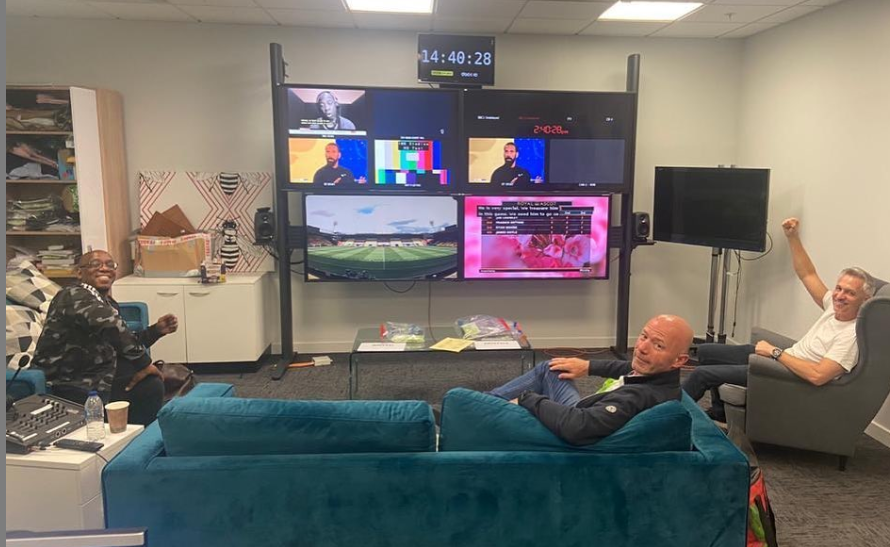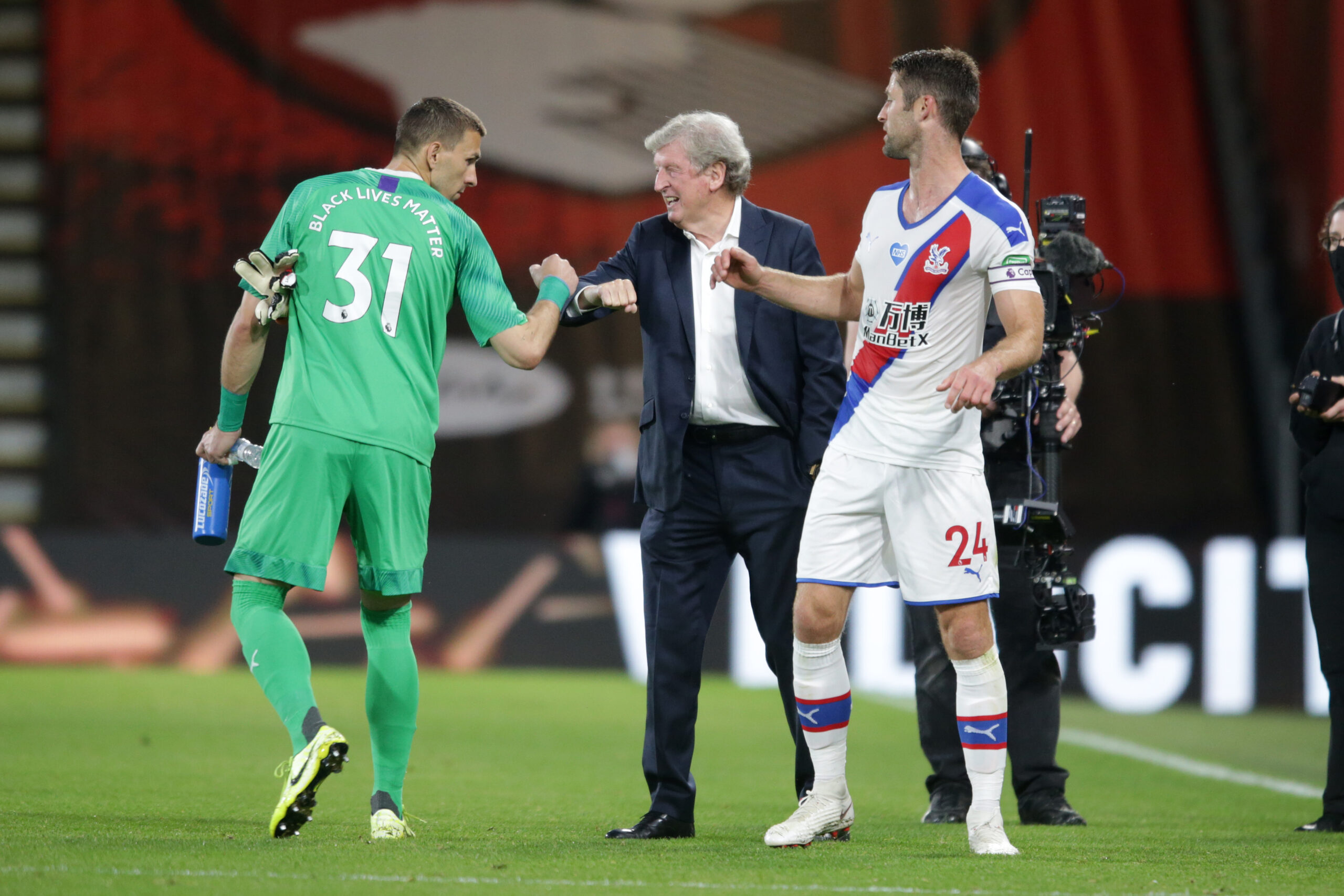Whoever would have thought Crystal Palace and Bournemouth would be involved in not one but two broadcasting firsts during the 2019-20 season?
Palace’s 1-0 victory over Bournemouth at Selhurst Park in December was the first Premier League match shown live in the UK by Amazon Prime. Six months later, the BBC, which would be showing its viewers games from the Euro 2020 finals right now but for the pandemic, instead broadcast its first ever live Premier League fixture last night… Bournemouth v Crystal Palace.
Advertisement
It was the first time in 32 years the BBC had screened a live top-flight football match, after it was handed four games when the Premier League announced it would restart the season and televise every game. In March 1988, Jimmy Hill presented its coverage of the North London derby — a 2-1 win for Arsenal over Tottenham at Highbury. George Graham and Terry Venables were the respective managers, Margaret Thatcher was prime minister and Kylie Minogue topped the UK singles chart.
Palace’s 2-0 win at the Vitality Stadium was watched by a peak audience of 3.9 million, a 24.5 per cent share of the UK TV audience on Saturday night, while it had an average audience of 3.6 million (22 per cent share). When combined with digital audiences of 660,000 on iPlayer and the BBC Sport website, it is the most-watched Premier League match to date in the UK — just beating the 4.05 million average audience for Manchester City v Manchester United on Sky Sports in April 2012.
Presenter Gary Lineker, joined by pundits Ian Wright and Alan Shearer, introduced the BBC’s coverage by saying, “We’re back! We know it’s not really important, but we’ve missed it.” It was true for supporters but also for the BBC, who no doubt would rather have had its own hiatus come to an end in different circumstances.
Fans’ messages were shown on the big screen, the pundits sat slightly further apart in the studio in Manchester and the empty seats at the Vitality were covered in banners an attempt to make it feel as realistic as possible.

If this was a particularly important occasion for the BBC, it was not immediately apparent. Lineker made a point of mentioning, both in his opening and closing remarks, that it was the first live Premier League game the channel has ever shown, but there was little fanfare.
Roger Mosey, former head of BBC Televisions News and director of the corporation’s coverage of the 2008 and 2012 Olympic Games, believes the cost of showing Premier League football — UK television rights cost approximately £4.5 billion for the 2019-22 cycle — is ultimately prohibitive for the BBC. These free matches, however, will help to boost viewing figures for Match Of The Day, which attracted 2.7 million viewers later on Saturday night.
Advertisement
“The BBC does very well with Match Of The Day. The Premier League has always liked a combination of live matches on Sky — and now Amazon and BT — with highlights on BBC1,” he tells The Athletic.
“But BBC showing live Premier League is probably a complete one-off because the costs of live football have gone so astronomically high in recent years and the pressure on BBC finances are so heavy.
“The core of what the BBC does still has to be Match Of The Day. It is being eroded a little bit by clips on phones and social media, with highlights on the BBC website, too. The live matches on BBC may enhance Match Of The Day and show the BBC is still a place where the nation can watch football. That is a great thing.
“What matters is the football, and good coverage of the game with a decent commentator. You can overdo gimmicks… and what gimmicks are even left? The BBC should do what it always does: good, classic, sensible coverage of the match.”
Extraordinary circumstances have changed the dynamic of watching football in 2020.
Gone, for now, is the opportunity for supporters to take their seats in a stadium, replaced by gimmicks including fans being shown on the big screen as they watch the action at home and cardboard cutouts of people replacing the real thing in the stands. Alongside the live programme, some 100,000 people opted to view a “watchalong” of Bournemouth-Palace with the BBC’s social spin-off MOTDx. Piped-in crowd noise and commentary could be silenced at the viewer’s discretion. “There’s something that is missing in respect of that feeling you get in your stomach,” offered pundit Wright by way of pre-match analysis.
It all ran rather smoothly, despite the logistical challenge of broadcasting within social distancing guidelines, but there had to be subtle changes, as the BBC commentator Steve Wilson explains.
Advertisement
“(Normally) You sort of communicate with your co-commentator (Jermaine Jenas last night), who sits next to you, with your body language,” he tells The Athletic. “There are little nudges and glances, but that isn’t possible because we are socially distant. You would also have a floor manager and sound manager to cover any technical issues and now we are all sat apart, which is totally different.”

“If I want Jermaine to comment on something, I’ll have to say, ‘What do you think about X or Y?’,” says Wilson. “If he was next to me, I might have given him a nudge and a glance and he would know what I meant. It’s just the little things. The biggest difference for me is I had a decision to make — do I use artificial sound in my headphones or not?
“It helped me commentate in a more normal fashion. You can get caught into being self-conscious if you’re speaking loudly in a stadium that is empty. In a small stadium like the Vitality, a player might be taking a throw-in and might be able to hear you commentating 15 yards away. He will hear me regardless (as the sound effects added for broadcast were not played in the ground), but if I have the crowd noise, I won’t be so conscious of it. It’s not ideal, but it is how I will feel most natural.”
“Everything you’re saying, people can hear,” Jenas observed. “We have to try to create our own atmosphere.”
For the BBC, whose staff arrived in Bournemouth at 9am on Friday to begin setting up, there were challenges. There were 130 BBC staff inside the Vitality — significantly fewer than there would be in ordinary circumstances — a camera was fixed to the ceiling of the tunnel to replace the usual in-person operator and pitchside reporters Kelly Somers and Alex Scott stood several feet apart.
Somers said: “Before the game, myself and Alex did a bit about what was different in football. Alex did that and then did a two-way with the studio. She spoke about Black Lives Matter, and it was so impressive. She put the topic back on Alan and Gary to ask how they felt about it too.
“Alex is brilliant, she’s so on it. I was really proud of the BBC with how they tackled the issue head-on. They had two people of colour (on screen, Wright and Scott), they threw the issue back on white people and also had two women at their first ever Premier League game, as it should be. A few years ago, I don’t think it would have been.”
Advertisement
For Wilson, the concern of mistaking substitutes weighed on his mind. Ordinarily, the fourth official would brief who is due to come off and on, but that could no longer happen due to social distancing. The names on the backs of the players’ shirts were also replaced with ‘Black Lives Matter’, making the task more tricky.
“Something you are aware of is that there is more at stake if you make a mistake,” Wilson explains. “Ultimately, you can’t prepare properly. It’s like preparing for a penalty shootout. It’s not the same on the training pitch where there is no pressure.”
Palace’s players had travelled the 100 miles down from London on the day of the game. They occupied the away dressing room as well as part of the ticket office adjoining it to allow for sufficient distancing. Not the ideal preparation, but 23 minutes in they already led 2-0. Roy Hodgson had his team sharp, fit, and playing expansively on the counter.
It was Palace’s fourth consecutive clean-sheet victory — the first time they have achieved that in the top flight. Hodgson also noted he had never won four in a row in one Premier League season before.
Sterner tests than this will come in due course, starting in midweek away to champions-elect Liverpool, but Palace certainly carried on where they left off before football’s suspension.
For the BBC, this was a steady, safe return to broadcasting live top-flight football. In a match that was right at the bottom of the broadcasters’ selections (the ninth or 10th pick out of the 10 played in this round of games), it was rewarded with something that caught the eye, even if it was not quite the most dramatic 90 minutes ever played.
Perhaps not the most glamorous match-up, but groundbreaking nevertheless.
(Top photo: Robin Jones/AFC Bournemouth via Getty Images)
